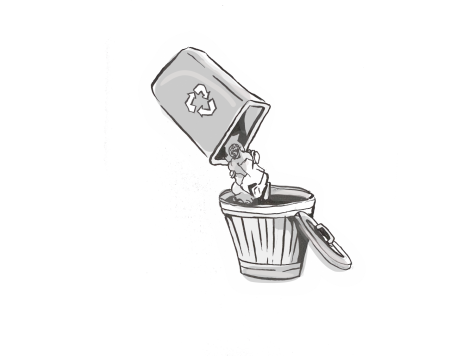Walla Walla suspends plastic recycling over costly contamination
February 18, 2021
Walla Walla residents can no longer recycle plastic. On Oct. 14, 2020, the Walla Walla City Council decided to pause plastic recycling, starting in 2021. The suspension will be reevaluated in 2023 if the contamination of recyclable waste is reduced.
Plastic is currently not included on the list of recyclable items, which features paper, cardboard, tin and aluminum. According to the City Council minutes, this exclusion is made in order to reduce costs related to contamination of recyclable waste. There are seven types of plastics commonly used; however, only two types are recycled by the city. The confusion amongst citizens about which plastics are recyclable has caused considerable contamination.
Fifteen to twenty percent of waste (by weight) contained non-recyclable items that were mixed with recyclable items. This mixture ended up making recyclable material non-recyclable. The cost of recycling materials increases with more contamination.

The Walla Walla City Council formed a Recycling Ad-Hoc Committee on Feb. 12, 2020, to create a proposal for possible solutions to reduce contamination of city-wide recycling. They were also assigned to work towards solutions that will preserve and encourage recycling while being mindful of the costs.
According to the committee’s proposal, plastic will be entirely removed from recyclable materials in Phase 1. The City will then track to spot any reduction in contamination, to identify if a pause on recycling plastic reduces contamination to any extent. If contamination is reduced, Phase 2 will be implemented. In Phase 2, highest-value plastics will be recycled. In mid-October, the Walla Walla City Council voted to accept the Recycling Ad-Hoc committee’s proposal.
“I’m not necessarily dissatisfied with the Walla Walla recycling,” Nat Lange, a member of the ASWC Sustainability Committee, said.
Lange said that the recycling system in his hometown of Bainbridge, Washington, is similar to that of Walla Walla — previous to its suspension of plastic recycling.
Dealing with contamination has become expensive for Walla Walla.
“It seems like a good idea to pause for a moment, reevaluate and come back with a better, more efficient and cheaper recycling model in a year or two,” Lange said.
The Recycling committee plans to work to reach a recycling rate of 50 percent. Despite the new changes, if contamination continues to be a problem the City plans to re-evaluate the recycling system in the year 2023. This would mean that the old three-bins disposal system could be implemented again.
The Ad-Hoc Committee plan stresses that recycling, at this moment, is “wishful.” People often recycle as many items as they can instead of the correct items, which results in non-recyclable products put with recyclable commodities. In the coming weeks, the City Council plans to campaign, to spread the message of recycling and composting amongst residences and businesses. The City plans to educate the community for better recycling practices and to make recycled waste marketable overseas.
Recommendations from the committee include explaining how the recycling system works, why plastics are a problem and the importance of reducing contamination.
“My recommendation is, if you are concerned about Walla Walla not recycling plastic anymore, try to avoid or skew your purchasing towards aluminum cans rather than plastic bottles,” Lange said.
Lange suggested that ideally, people should stay away from single-use plastic, especially now that it cannot be put for recycling. He also expressed that his larger complaint is with glass being non-recyclable. In the Committee’s recommendations to spread awareness, they are also planning to communicate with citizens on why glass is not recyclable, and additionally explain what the citizens and the City can and cannot control.




Edward • Feb 21, 2021 at 5:49 pm
Previous remarks. If you don’t know where Walla Walla is then it shouldn’t matter what State it is in.
I think most people don’t know what type of plastics can be recycled. They say the types like everyone works at the recycle plant where they should be explaining the actual types by description that the average person would know, milk jugs, soda bottles and what types are not allowed. This alone will cvut down contamination. Also, I know they said laundry soap bottles but I don’t know anyone that will go through gallons of water to clean them out.
Glass, I came from Las Cruses, NM and they recycle glass. They have a method that grinds it up real good and then give away to anyone that wants it for free to use as landscape cover. Clear, Green, Brown, etc colored glass. Check it out.
Brittany • Feb 21, 2021 at 10:07 am
Why is glass not being recycled? Glass is endlessly recycling and quality doesn’t degrade like plastic
ZACKLY Dalpay • Feb 20, 2021 at 6:29 am
20 February 2021
Excellent Choice to end Recycling in the Dalles.
The Columbia River has enough : Moonshine, CBD OILS, Fertilizers and Fentanyl. MISSING FUEL PUMP SYSTEMS, ARE ALSO PROBABLY NEEDED TO CLEAN UP THIS MESS.
MEANWHILE BACK IN FLORIDA……
they are trying to explain the DEATH of Sea Cows {aka} Dujong {aka} Manatee . Perhaps, NARCOTICS smugglers….. dumping ; Moonshine, heroin, cocaine, CBD OILS & Fentanyl into the Township of Narcoossee is to blame.
Time will Tell.
Sally Abbott • Feb 20, 2021 at 5:25 am
What state is Walla Walla in? This should be required on all articles.